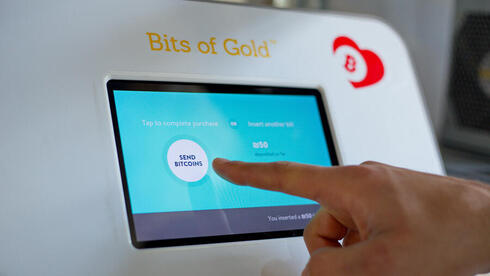Israeli cryptocurrency firm Bits of Gold is launching a pilot program for a stablecoin pegged to the Israeli Shekel, issued initially on a demand basis to an exclusive circle of predefined clients.
3 View gallery


A Bits of Gold cryptocurrency ATM machine
(Photo: Bits of Gold)
Private customers will not be able to access the coin, and all issuance, usage, or transfer will occur within a Sandbox experimental phase, ensuring no impact on operational systems.
Private customers will not have access to the coin, as all issuance, usage and transfers will take place within a “Sandbox,” a controlled testing environment where new technologies, protocols or financial products can be deployed and tested without affecting the main operational systems or the broader market.
The project is run in collaboration with Fireblocks, Solana and QEDIT, with the pilot being launched under the approval of the Capital Market Authority. Bits of Gold founder and CEO Yuval Roash is leading the initiative.
Stablecoins are a category of crypto assets designed to maintain a steady value against a non-crypto reference asset, in this case, the New Israeli Shekel. The majority of stablecoins in the crypto market are pegged to the dollar, with the largest among them, USDT, currently holding a market value of over $100 billion.
3 View gallery


Bits of Gold founder and CEO Yuval Roash
(Photo: Ronen Goldman)
This helps facilitate trading in the highly volatile cryptocurrency market. These coins, due to their stable value, are not intended for speculative trading as they are not expected to yield any return. Their significant presence in the crypto market, especially those pegged to the U.S. dollar, has prompted regulators worldwide to seek regulation of their use, fearing that these private initiatives circumvent monetary sovereignty and establish a global-scale alternative to central banks.
Central banks around the world are currently working on the development of central bank digital currencies (CBDC) to address some of the uses of private stablecoins. In Israel, regulators are exploring the concept of a “digital shekel,” with several pilots already conducted in the field.
In recent years, popular stablecoins have moved away from centralized pegging, with one notable collapse being that of Terraform Labs with its algorithmic stablecoins, Terra and Luna.
The project’s failure created a cascading effect throughout the market, putting pressure on crypto companies that held these coins as investments. Among these was the American Israeli company Celsius, which subsequently collapsed and has been in bankruptcy proceedings since. A criminal case is underway against one of its founders, Alex Mashinsky.
To ensure stability, these coins are backed by either solid traditional assets (such as dollars or government bonds), cryptocurrency collateral (such as Bitcoin), or offer “algorithmic stability” (unsecured coins). The ability to maintain a stable value is critically linked to the utility they provide in the market.
3 View gallery


Bank of Israel building in Jerusalem
(Photo: Gettyimages)
Bits of Gold is conducting its pilot in line with regulations published by the Bank of Israel last year, requiring issuers to back their currency with 100% collateral, consisting of the pegged asset.
Thus, Bits of Gold must hold collateral in shekels equal to the value of all issued Bills coins. This collateral may be in cash or other low-risk liquid assets, like short-term government bonds, as per the Bank of Israel.
The company must ensure the quantity of Bills coins issued and traded on the blockchain doesn’t surpass its shekel reserves. Under the Bills operating model, coins are issued on demand and “burned” upon redemption, guaranteeing no excess Bills coins remain in circulation.
“Anyone with Internet access can use the stable shekel, BILS, to store value and conduct financial transactions, even without a traditional bank account,” said Roash.

